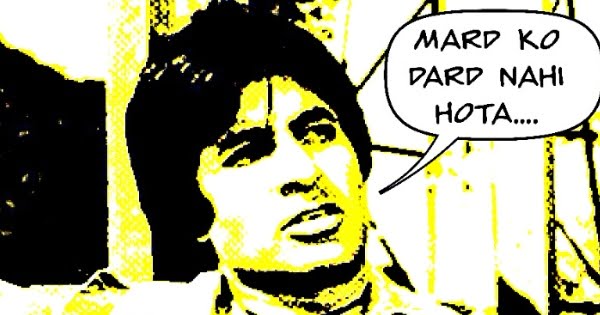
“Mard ko dard nahi hota.”
“Mard hai tu, haatho pe chudiyan nahi pehni tune.”
“Kya ladkiyon ki tarah ro raha hai.”
“Biwi hai teri, do laga, kaise nahi manegi?”
(Men don’t feel pain.
You’re a man, you shouldn’t wear bangles on your wrists [act feminine].
Why are you crying like a girl?
She’s your wife, slap her, and she’ll come around.)
We often come across these very common phrases in our day to day life, be it through our social interactions or through the media or cinema, which forms our understanding of who a mard (man) is.
In today’s contemporary world, life is changing with each and every tick of the clock. But we are still accommodating a rudimentary idea of ‘manhood’ in society. We give the status of “Devi” (or goddess) to an Indian girl as soon as she comes out of the womb, but men are treated differently for their inappropriate behaviour and often compared to animals, negating the fact that they must be taught good behaviour, in order to make women feel that they are equal, which we actually don’t believe they are. This hypocrisy affects both men and women (and people of other genders). The burden of performing a social role kills the basic instincts of an individual, irrespective of gender.
In the late 20th century, we have seen on celluloid the artistic work of Amitabh Bachchan as mard, who stands against the evils of the society, who saves the heroine, who never cries, and is the only righteous person in the setup. But do we really think that this notion of mard is appropriate enough to address the idea of manhood? Or is it just another reflection of male chauvinism?
Let’s, find out who a real mard is:
- A man is someone who not only believes but also practices gender equality, in every sense, be it personal, professional, economic, as a father, son, husband, brother, friend, colleague, or even as a stranger.
- A man is someone who does not impose his physical strength on any individual until and unless that act is done for self-preservation. So, those who believe that showing power and force in bed, with any individual is manhood must ask to themselves what sort of power is proven only by letting down someone.
- A man is someone who is emotional and expresses his feelings. The phenomenon of “boys don’t cry” is actually making men weak and vulnerable. It’s creating a hollow inside them. According to psychology, the tendency to cry is more frequent in women and that’s why they are better equipped and more sensitive towards handling emotions and relationships. Strength is not about bodybuilding, or showing weakness, or hiding your imperfections, or controlling your tears. It is about facing the challenges of life, building a career, building healthy relationships, and having the ability to accept change. It is also about facing your own self, being able to express and understand and reciprocate. It is about building your emotional self.
- Men are not usually very keen on criticism, especially when it comes from a woman as it really hurts the infamous male-ego. But by doing so, they are actually creating a huge loss in their personality development process. Criticism is, among other things, a check on one’s conduct, it helps us to become better through knowledge of problems, of which we may oblivious. So men must understand and appreciate criticism.
- Reproduction and production should not be associated with gender. The outlook towards a man must be changed. The pressure of having a secure job, or the tag of the family breadwinner for men, and the idea of child-rearing as a mother’s duty must end. These responsibilities must be shared equally. It will help in building mutual respect as one will experience each responsibility equally.
The fundamental idea behind manhood is not masculinity, it’s the sensitivity.
We live in a world with heterogeneous gender identities and it’s not possible that either a man or woman can go it alone. Both need each other in their own way. One gender superseding another is not the solution because it’s not a fight for superiority, neither is it a competition. Our urgent need is for an equal partnership and companionship among all genders to create a just and egalitarian society.
